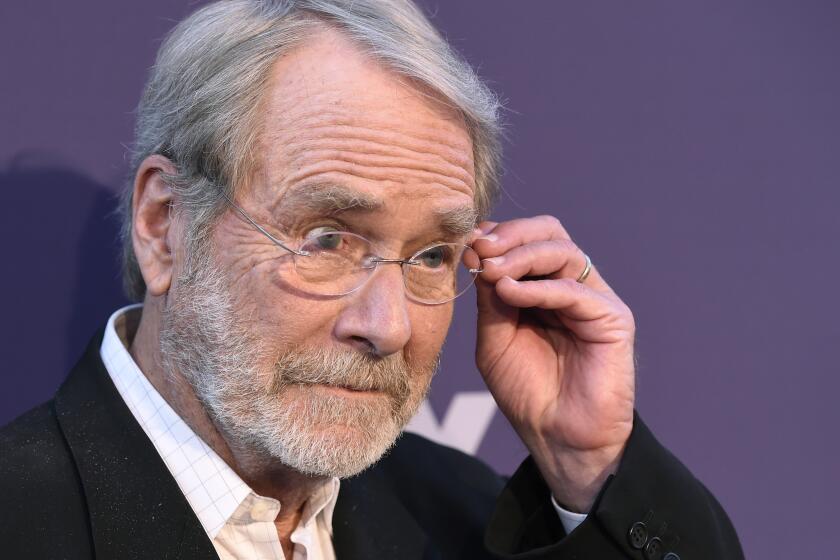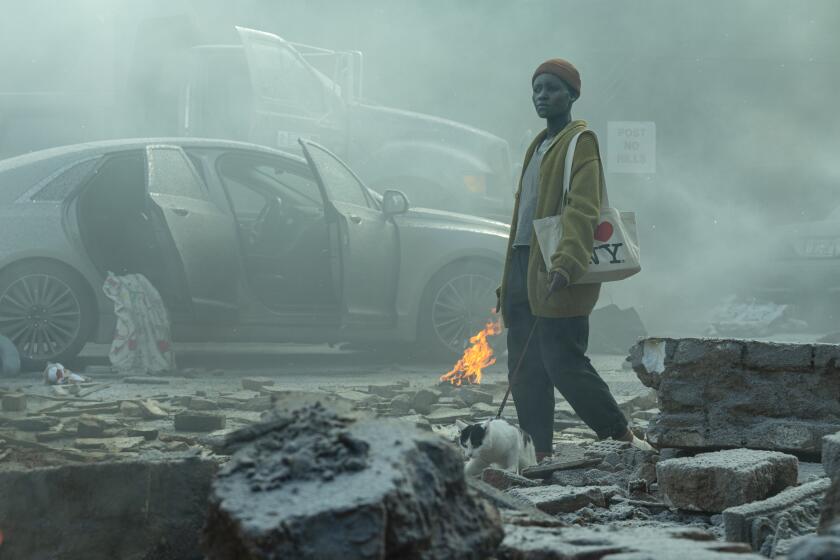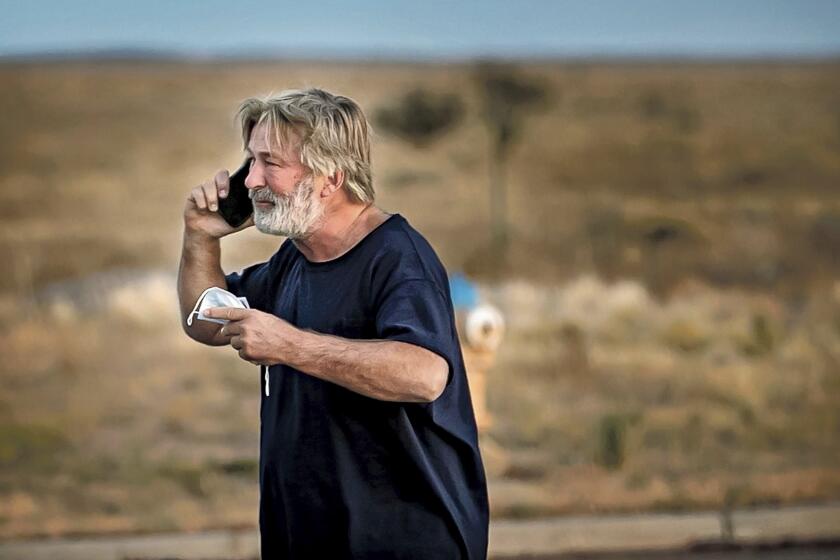Indie Focus: Oscar nominations aftermath and reconciling Michael Bay and Philippe Garrel
Hello! I’m Mark Olsen, and welcome to your weekly field guide to a world of Only Good Movies.
This week sees the premiere of the a television program hosted by my colleague Rebecca Keegan and myself on Ovation TV. Over the next five weeks there will be a series of conversations among actresses, actors and directors. Did we get it exactly right as to who the eventual Oscar nominees were going to be? No. Did we create some unexpected chemistry making for lively talks that went in directions we didn’t exactly foresee? Yes.
The team is back out, turning over rocks and working the phones for some upcoming screening events too. Some fun ones are coming up, so, as always, check back to events.latimes.com to keep up on everything that’s happening.
Nonstop movies. Movies nonstop.
Oscar nominations: So that happened
As you may have heard, the Oscar nominations came out this past week, and while there may be much to celebrate among all those categories, there is also cause for concern and alarm. Allow my colleagues Steve Zeitchik and Rebecca Keegan to explain:
“It’s another embarrassing Hollywood sequel: For the second year in a row, the Academy of Motion Picture Arts and Sciences has nominated an all-white group of acting nominees.
“This year’s list of Oscar nominees passes over popular, well-reviewed performances in the movies ‘Creed’ and ‘Straight Outta Compton’ and excludes prominent actors of color in 2015 films including Idris Elba, Samuel L. Jackson and Will Smith.
“The news again provoked an outcry and raised fresh questions over a familiar issue: whether an industry that prides itself on its progressiveness remains stubbornly stuck in the past.”
Mary McNamara also looked at the nominees and declared, “The winner of the 2016 Oscar in practically every category is … white men facing adversity.”
She added, “To be clear, these are all good stories, powerful, well told and beautifully acted. But in world filled with billions of people who are not white men, they are certainly not the only good stories, not by a long shot.
“Though our demographics and attitudes continue to change, Hollywood’s definition of great drama has remained stubbornly attached to standards and expectations set back when men were men (if they were white) and everyone else needed to just shut up and listen.”
Kenneth Turan took an even further step back to make sense of how films such as “Brooklyn,” “Room” and “Carol” all fit into that mix.
“Despite the mysterious exclusions, despite the perplexing and continually disturbing absence of people of color from the acting nominations, the voters in the specific branches gave indications of taking their jobs seriously, of looking past the obvious films to make their choices.”
Glenn Whipp also offered some analysis, in particular on one of the most surprising Oscar omissions.
“Maybe the film academy can handle only one career coronation at a time. DiCaprio, yes. Ridley Scott, no.
How else do you explain the shocking exclusion of legendary filmmaker Scott, even though his movie earned seven Oscar nominations, including best picture? Has the ornery Brit rubbed people the wrong way over the years? Or is this another example of the Oscars’ bias against (ahem) comedy?
Michael Bay and ’13 Hours’
Sometimes amidst the seriousness of Oscar season it’s good to take a break with something that isn’t destined for awards consideration. Michael Bay’s “13 Hours: The Secret Soldiers of Benghazi,” which details the 2012 attack on Americans in Libya, is an example of the polarizing work of a filmmaker who is simply too much a part of our times to ignore. Regardless of how you feel about his work, Michael Bay is a filmmaker to be reckoned with.
As Michael Phillips says in his review for the Chicago Tribune, “Everything in director Michael Bay’s cinematic vocabulary — the glamorizing slo-mo, the falling bomb point-of-view shots, the low-angle framing of his heroes with blue sky, fireballs or an American flag in the background — suggests not real life, or the way things might have happened, but a Michael Bay movie.”
Steve Zeitchik wrote about the making of the film, in particular its relation to the ongoing political theater surrounding the response to the attacks and then Secretary of State Hillary Clinton.
“Most pertinent for the current electoral climate, Clinton’s name is never mentioned in ‘13 Hours,’” Zeitchik wrote, “and what effect the movie will have on her current stock or campaign is unclear. Essentially, that question rests on the issue of whether a piece of cinema that stirs in the viewer a more generalized outrage — the ‘how could this happen’ question — will land with the same impact, or possibly an even stronger one, than an account that does name those responsible. Certainly many will come away from the film with a sense of anger, but viewers are left to decide where to direct it.”
And nobody writes about contemporary action cinema quite like Manohla Dargis. In the New York Times, she said:
“Those blazing wheels and several nods to Joseph Campbell suggest that there is more going on in ’13 Hours’ than in the usual Michael Bay conflagration. The king of screen chaos, he is best known for the ‘Transformers’ series, with its battling robots. He makes big, bludgeoning movies stuffed with nonsense, special effects and military fetishism, and while they are ridiculous they can be absurdly entertaining when they’re not boring you out of your mind. A maximalist to the max, he has no interest in artistic niceties like nuance, scale and pacing, but he does know how to blow stuff up. What makes his commitment to mayhem somewhat interesting is that it’s never clear if this aesthetic of bombast originates from self-parody, a lack of self-awareness or maybe both.”
Philippe Garrel and ‘In the Shadow of Women’
Philippe Garrel is a filmmaker I have grown increasingly fond of over the last handful of years; his recent autumnal examinations of the tribulations between men and women are an uncanny mix of the hopefully romantic with tinges of hard-learned wisdom. His latest film, “In the Shadow of Women,” just opened in New York and comes to Los Angeles later this month.
In his review when the film first premiered last year, Scott Foundas wrote in Variety:
“Like so much of Garrel’s work, this intensely personal rumination on life, politics, art and the battle of the sexes is a very particular brand of cinema for a very specific crowd — which should stand ‘Women’ well in territories where the veteran French auteur has established a small but passionate following.”
In a more recent review of the film, A.O. Scott wrote in the New York Times that “the film has a curiosity about how women deal with a selfish and unreliable man that feels more gallant than empathetic. But Mr. Garrel is always worth attending to when he takes up the rhythms and paradoxes of love, and even though this is a minor entry in his canon of melancholy romances, it is brief, brisk and intermittently affecting.”
70-mm films at the American Cinematheque
With the release of Quentin Tarantino’s “The Hateful Eight,” there’s been a lot of talk about 70-mm projection. And the good people of the American Cinematheque are putting on a special series,”Seeing The Big Picture,” at the Egyptian Theatre in Hollywood and the Aero Theatre in Santa Monica from Jan. 21 to Jan. 30. Among the films screening will be Paul Thomas Anderson’s recent “The Master” and such wide-screen favorites as “Ben Hur,” “It’s A Mad, Mad, Mad, Mad World” and “Lawrence of Arabia.” The 70-mm presentation of Alfred Hitchcock’s “Vertigo” on Jan. 24 should be something very special indeed.
Email me if you have questions, comments or suggestions, and follow me on Twitter @IndieFocus.
More to Read
Only good movies
Get the Indie Focus newsletter, Mark Olsen's weekly guide to the world of cinema.
You may occasionally receive promotional content from the Los Angeles Times.







